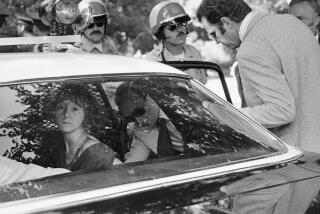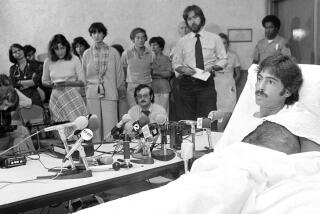Relatives Testify in Civil Rights Murder Case
PHILADELPHIA, Miss. — The prosecution closed with the mother of victim James E. Chaney describing how the family waited in vain for him to come home for dinner. The defense opened with a brother and sister of the accused, Edgar Ray Killen, telling the court Saturday that Killen was with them that day, at a backyard Father’s Day gathering.
Killen, 80, is accused of directing the brutal ambush in 1964 that ended in the beating and shooting deaths of Chaney and two other civil rights workers.
It was the third day of testimony in the fast-moving trial. Two final defense witnesses and closing arguments are expected to be presented Monday.
Killen, who was a member of the Ku Klux Klan at the time of the killings, is charged with three counts of murder. However, Mississippi Atty. Gen. Jim Hood told reporters Saturday that prosecutors would ask the judge to allow the jury to consider lesser charges of manslaughter, which would carry a maximum 20-year sentence for each charge.
Killen’s brother, Oscar Kenneth Killen, and sister, Dorothy Dearing, testified Saturday that their brother was at a family cookout until late in the afternoon on the day of the killings.
Oscar Kenneth Killen also testified that he saw his brother at a funeral home the night of the killings and denied that his brother was a member of the Ku Klux Klan. “Until he tells me so, I still don’t believe it,” he said.
Edgar Ray Killen’s lawyer had acknowledged in his opening statement Wednesday that Killen had been a Klan member. On Friday, witnesses for the prosecution testified that Killen had recruited them into the Klan.
On the stand, Killen’s brother was dismissive of the prosecution case, alleging that “most of all this stuff y’all have is paid stuff.”
The charges against Edgar Ray Killen stem from the June 21, 1964, beating and shooting deaths of Chaney, a black man from Mississippi, and Andrew Goodman and Michael H. Schwerner, both white and from New York. The three were working together to register black voters across the state. They were attacked by a gang of Klansmen outside this rural lumber town; their bodies were found 44 days later buried in an earthen dam. The killings proved to be a flash point in the civil rights movement.
On Friday, prosecutors presented testimony from witnesses, living and dead, who portrayed Killen as a Klan leader who directed and organized the murder plot.
Much of the days’ testimony came from transcripts of a 1967 federal trial in which Killen and several others were charged with violating the civil rights of the slain men. Killen was set free when the jury deadlocked 11 to 1 in his case.
One after the other, the testimony of now-deceased Klansmen was read into the record as they described how Killen promoted the group as “Christian” and “benevolent” with a “prayer atmosphere.”
Still, Killen was clear about their mission: “Mr. Killen told me it was a strong organization to help keep the colored people out of our schools,” Carlton Miller, then a police office in nearby Meridien, Miss., testified in 1967. Another Klansman, Delmar Dennis, said Killen told him the Klan was “no Boy Scout group” and that it dealt in threats, beatings, cross burnings and, at times, murder.
The living witnesses included former FBI agent Jay Cochran, who testified that it took a bulldozer to dig deeply enough to find the bodies of the slain men. When a decaying odor filled the air, blowflies appeared and birds of prey gathered in the distance, they knew they were close to finding the missing men, he said.
Goodman and Schwerner were found face down 15 feet in the ground with gunshot wounds to their chests. Chaney was found face up, beaten and with a bullet in his head.
Killen, who dozed through much of Friday’s testimony, had been taken to the hospital a day earlier after complaining of a “smothering” sensation in his chest. When Andrew Goodman’s mother, Carolyn, took the stand about 1 p.m. on Friday, Killen looked up and listened.
Hours before he was killed, Goodman had mailed his parents a postcard to let them know he had arrived safely in Mississippi. “The people in this city are wonderful and our reception was very good,” Goodman wrote.
At 89, her memory failing, his mother said that the terrible days that followed her son’s disappearance come in flashes now. “The things I remember are so choppy,” she said, her eyes filling with tears. I remember the red soil and that he was buried there. It was all so horrible.”
As its final witness Saturday morning, the prosecution called the mother of another victim to the stand -- 82-year-old Fannie Lee Chaney.
Now living in New Jersey, she testified that she was forced to move from Mississippi because of death threats she received after the slayings.
Eggs were thrown and shots were fired at her house, she said. A caller once told her she had best move away because someone would put dynamite under her house. “I wasn’t going to be there long before I be put in a hole like James was,” she said.
The last time Chaney saw her 21-year-old son James was hours before his death, when he left her house to deliver books with Schwerner and Goodman.
She recalled that James’ 10-year-old brother, Ben, cried and begged to tag along.
“I told [Ben] to go to Sunday school,” Chaney said. She told Ben that his brother, whose nickname was J.E., would be back before long and they would share a meal together. “But J.E. never come back,” she said.
After her testimony, Chaney walked slowly from the witness stand, assisted by her daughter and leaning heavily on a cane. Killen glanced her way, expressionless.
More to Read
Sign up for Essential California
The most important California stories and recommendations in your inbox every morning.
You may occasionally receive promotional content from the Los Angeles Times.










